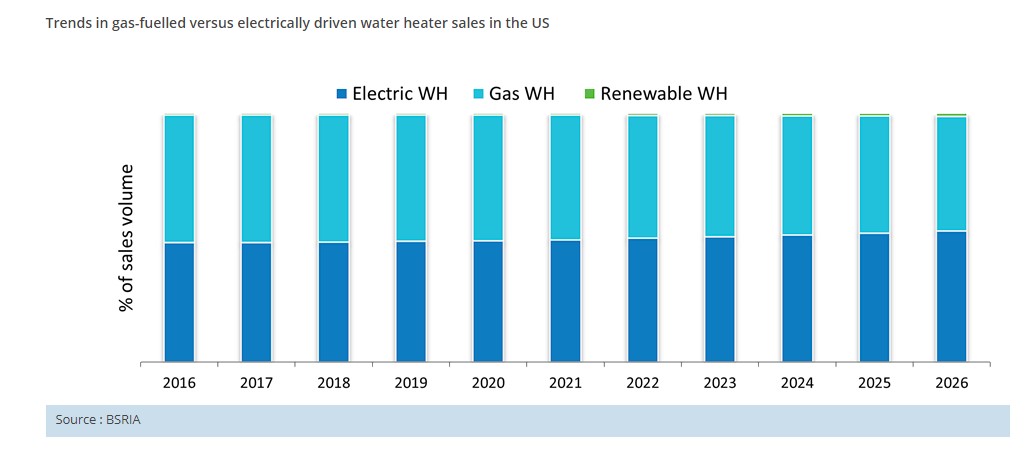US water heating market update 2021

|
With 1.3 million gas water heaters sold to Californian homes – or one quarter of the US market – it is no surprise the impetus for tighter building regulations came from the West. In July 2019, Berkeley, California became the first city in the nation to ban natural gas connection in new construction and large renovation projects. Brookline, Massachusetts, Seattle and 42 cities and counties in California also announced gas phaseouts.
Oregon became the second state, after Washington, to adopt a standard for grid-enabled water heaters. The standard requires electric water heaters to be able to automatically adjust their power usage in response to changes in electricity prices or the needs of the power grid. Nevada legislators authorised their state energy office to adopt similar grid-enabled standards for energy-intensive appliances like air conditioners and water heaters.
While some states are adopting increasingly ambitious clean electricity standards and/or greenhouse gas emissions reduction goals to move away from fossil fuels, opposition remains strong. Laws to protect natural gas use have been adopted in Arizona, Louisiana, Oklahoma and Tennessee. Similar laws have been proposed in Texas, Florida, Georgia, Iowa, Kansas, Missouri, Pennsylvania, Utah, Indiana, Arkansas, Kentucky and Mississippi. Considering half of the US water heating market is driven by the sales of gas-fuelled units (USD 3.9 billion in 2021), industry experts foresee a slow shift in technologies.
BSRIA’s research points towards moderate acceleration of sales of electric storage water heaters, whereas those of all gas-driven units have been forecast to plateau in the coming years.
The imbalance between the cost of gas and electricity is a clear obstacle to the refurbishment of systems. As most buildings in the US were built before the 1980s, additional enhancements of the building structure are often required to accommodate new technology, adding to the final bill.
Another trend emerging in both the residential and the commercial water heater market is the gradual rise of gas-fired condensing technology, for both storage tank and tankless type water heaters. The upgrade of gas water heater is growing to meet energy efficiency standards.
More information on the world residential and commercial water heating markets is available from BSRIA’s library of reports.
This article originally appeared under the headline, 'Water heating market update 2021' on the BSRIA website. It was published in November 2021.
--BSRIA
[edit] Related articles on Designing Buildings
- American architecture and construction.
- BSRIA articles on Designing Buildings.
- Greenhouse gases.
- Heating ventilation and air conditioning HVAC.
- Hot water.
- Natural gas.
- Types of domestic heating system.
- Water heating.
[edit] External resources
Featured articles and news
CIOB report; a blueprint for SDGs and the built environment
Pairing the Sustainable Development Goals with projects.
Latest Build UK Building Safety Regime explainer published
Key elements in one short, now updated document.
UKGBC launch the UK Climate Resilience Roadmap
First guidance of its kind on direct climate impacts for the built environment and how it can adapt.
CLC Health, Safety and Wellbeing Strategy 2025
Launched by the Minister for Industry to look at fatalities on site, improving mental health and other issues.
One of the most impressive Victorian architects. Book review.
Common Assessment Standard now with building safety
New CAS update now includes mandatory building safety questions.
RTPI leader to become new CIOB Chief Executive Officer
Dr Victoria Hills MRTPI, FICE to take over after Caroline Gumble’s departure.
Social and affordable housing, a long term plan for delivery
The “Delivering a Decade of Renewal for Social and Affordable Housing” strategy sets out future path.
A change to adoptive architecture
Effects of global weather warming on architectural detailing, material choice and human interaction.
The proposed publicly owned and backed subsidiary of Homes England, to facilitate new homes.
How big is the problem and what can we do to mitigate the effects?
Overheating guidance and tools for building designers
A number of cool guides to help with the heat.
The UK's Modern Industrial Strategy: A 10 year plan
Previous consultation criticism, current key elements and general support with some persisting reservations.
Building Safety Regulator reforms
New roles, new staff and a new fast track service pave the way for a single construction regulator.
Architectural Technologist CPDs and Communications
CIAT CPD… and how you can do it!
Cooling centres and cool spaces
Managing extreme heat in cities by directing the public to places for heat stress relief and water sources.
Winter gardens: A brief history and warm variations
Extending the season with glass in different forms and terms.
Restoring Great Yarmouth's Winter Gardens
Transforming one of the least sustainable constructions imaginable.

























Comments
The cost of green electricity has to be made cheaper than gas but still we are comparing the cost of electricity generated by renewable sources with fossil fuels. Instead we should be showing how green electricity is cheaper per kwh than gas.The cost of green electricity has to be made cheaper than natural gas.